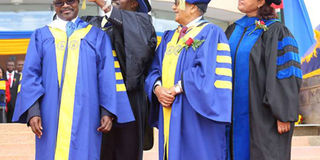Nations elevated and known by how they treat producers of knowledge

From left: Prof Paul Zeleza, the vice-chancellor of the United States International University - Africa, Linus Gitahi, the chairman of the institution's board of trustees, its chancellor Manu Chandaria and former vice-chancellor Prof Freida Brown. PHOTO
What you need to know:
I wonder why we haven’t taken the opportunity of the current state in global higher education to clearly define our path.
Why do we accept that voices in the wilderness must remain just voices?
This week, there is an education conference running at one university. Sampling the media, one doesn’t get a sense of the importance of such a conference to the current moment in our history. I am sure some analysis will come through soon. But will it be comprehensive and outline the key thoughts and nuanced presentations at the conference?
Incidentally, Palgrave Macmillan has also just released Paul Tiyambe Zeleza’s new book The Transformation of Global Higher Education, 1945-2015. Zeleza is a professor of history, a prolific writer-turned administrator whose majestic look at global transformations in higher education deserve attention. When I cross-checked, I could not find one single authored study by an African academic examining transformations in higher education systems globally. This study is, therefore, a first and deserves a separate review in the pages of this paper.
In a paper published this year in the journal, Internationalisation of Higher Education, Zeleza reaches a conclusion that should be at the heart of any conference on higher education. He argues that in the 21st Century, education systems around the world are less and less likely to resemble those of the 20th Century, concluding that “In this brave new world of transition and transformation, no system, country or region has a monopoly on the possibilities of reinventing the future of higher education.”
HIGHER EDUCATION
Essentially, Zeleza’s analysis tells me that Kenya has the capacity to determine how the transition and transformation in higher education will pan out. Kenyans can insert into the future that which they want future generations to inherit and use to define themselves. In other words, the Euro-American influence on this future is tenuous; its logic of education is just one among the many that would possibility compete for what the future of learning ought to be.
But these systems have one thing that we do not have. They understand the value of knowledge, invest in knowledge production and the community of knowledge producers and have a prospective look at what the outcome of those investments ought to be. In other words, at the core of the future of these nations is a realisation that the community of knowledge producers will define what the future ought to be and provide the narrative of what those nations become.
There is indeed a historic lesson to be learned here about who produces and shapes the narrative that defines a nation and what role serious learning plays in framing that narrative of growth or development. In Charles de Gaulle’s France, there was the towering voice of Jean-Paul Sartre who was committed to many social justice causes and rubbed the system the wrong way many times. Yet, even de Gaulle understood his towering relevance and treated him as the embodiment of French conscience.
Similarly, Gamal Abdel Nasser had his alter ego in the historian and journalist Mohamed Hassanein Heikal. In his hands as editor, Heikal grew Al Ahram into a leading paper. When Heikal criticised Nasser and state functionaries sought his arrest, Nasser wondered if it was possible to arrest the embodiment of Egyptian conscience.
The value serious political leaders place on knowledge and its capacity to shape nations stands out as key to shaping higher education. We might not have a Heikal or Sartre in our midst, but we have heroines and heroes whom we ignore every day. I have highlighted some such story in this column before. I imagine that such luminaries were invited to the higher education conference to help shape the future. However, I wouldn’t be surprised if many such voices were not invited.
But the more I think about it, I wonder why we haven’t taken the opportunity of the current state in the global higher education to clearly define our path. Why do we accept that voices in the wilderness must remain just voices?
Godwin R. Murunga is a senior research fellow at the Institute for Development Studies at the University of Nairobi.





